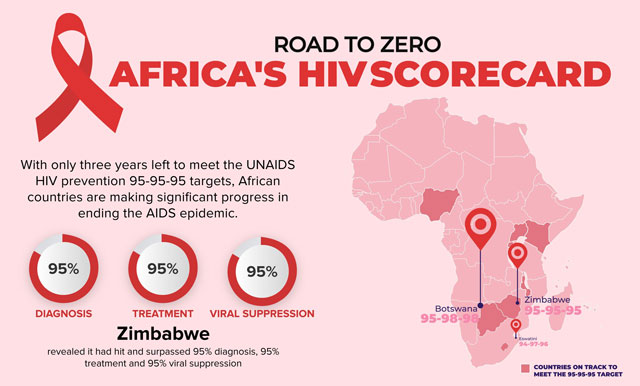
With only three years left to achieve the global testing and treatment targets, African countries are demonstrating significant progress toward HIV epidemic control.
Harare, Zimbabwe | BIRD AGENCY | To achieve the 2030 global goal of ending AIDS, the Joint United Nations Programme on HIV/AIDS (UNAIDS) tasked countries to ensure that by 2025, 95% of people living with HIV know their status, 95% of those who know their status are on treatment, and 95% of those on treatment are virally suppressed.
UNAIDS released this set of targets in December 2020.
By December 2021, 87% of people living with HIV in African countries knew their status, 77% of those who knew their status were on treatment, and 68% of those on treatment were virally suppressed, according to the World Health Organization (WHO), which has been tracking progress toward the 95-95-95 targets.
As the world commemorates World AIDS Day on 1st December, some African countries may have something to smile about as their accelerated progress toward ending HIV has led them to meet and surpass the targets.
Zimbabwe recently surpassed the global target on HIV testing, treatment and viral suppression, three years ahead of the set time, as reported by their state news agency, New Ziana.
Dr Chiedza Mupanguri, an official from the country’s Ministry of Health and Child care, presented the preliminary data for Zimbabwe at a Media Engagement Workshop.
He noted that Zimbabwe had “met the viral suppression target in the UNAIDS 95-95-95 target and is one of the highest reported levels of population viral suppression globally.”
Mupanguri said that the latest ministry data indicated that the country’s 1.3 million HIV-positive people reflected 96% of total diagnoses, those on treatment were 97%, and 95% of those on treatment were virally suppressed.
Zimbabwe reached this goal barely weeks after it became the first country in Africa and the third in the world, After Australia and the US, to approve an injectable cabotegravir (CAB-LA), an HIV-preventive drug recommended by the WHO.
Besides Zimbabwe, Botswana has also achieved the 2025 targets.
In July 2022, the government of Botswana announced that among adults (15-64 years) living with HIV, 95.1 per cent were aware of their status, 98 per cent of those familiar with their status were on ART, and 97.9 per cent of those on ART achieved viral load suppression.
Botswana’s Health Secretary Edwin Dicolotti also recently revealed the country’s approval of injectable antiretroviral drugs beginning January 2023 to improve adherence to HIV treatment.
“(The) government is working on introducing the injectable antiretroviral medication soon. Botswana has, through the professional guidance of the clinical guidelines committee, adopted the use of injectable antiretroviral medicines given every two months, for both prevention and treatment,” said Dikoloti.
The Kingdom of Eswatini also announced their HIV Impact Assessment survey results in September 2022, showing sustained progress toward the 95-95-95 targets.
“94 per cent of adults 15 years and older living with HIV are aware of their status, 97 per cent of those aware of their status are on antiretroviral therapy (ART), and 96 per cent of those on ART have achieved viral suppression,” the Government of the Kingdom of Eswatini announced.
While Eswatini fell short of meeting the 95% diagnosis target, its impressive achievements in treatment and viral suppression make it stand out among the countries that could hit UNAIDS targets before 2025. Overall, women achieved 95–98–96, while men reached 92-96-97.
Other countries on track to meet the 95-95-95 target include Cabo Verde, Kenya, Lesotho, Malawi, Nigeria, Rwanda, and Uganda.
****
SOURCE: By Bonface Orucho | bird story agency.
 The Independent Uganda: You get the Truth we Pay the Price
The Independent Uganda: You get the Truth we Pay the Price




